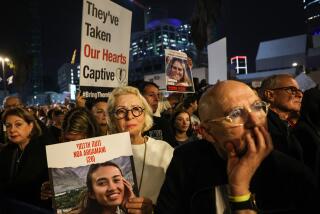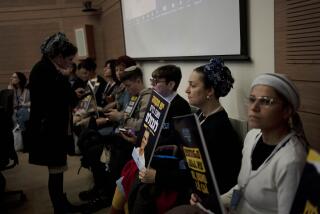In Jordan and Japan, an anxious wait for word on Islamic State hostages
Government officials and family members waited anxiously Friday for word on the fate of a Jordanian air force pilot and a Japanese journalist after the latest deadline for a proposed prisoner swap passed with no further contact from their Islamic State captors.
Jordanian officials are demanding proof that the pilot, Lt. Moaz Kasasbeh, is alive before releasing Sajida Rishawi, who sits on death row in Jordan for her role in a series of hotel bombings in 2005.
A Jordanian military spokesman, Mamdouh Ameri, said the government was working around the clock on the case. “We will inform you of any developments in due time,” he said in a statement.
A recording purportedly released by the militants late Wednesday said Kasasbeh would be killed if Rishawi wasn’t delivered to the Turkish-Syrian border by sunset Thursday.
Also in the balance is the fate of Japanese journalist Kenji Goto. The extremists have threatened to also kill him if Rishawi is not released.
The families of both hostages issued new statements Thursday, pleading for their release. Rallies have been held on their behalf in Japan and Jordan, two nations that are close U.S. allies.
The capture of the pilot, whose fighter jet crashed in an area of northeastern Syria that is under the militants’ control, has put Jordan in a difficult position. Kasasbeh is from a prominent local tribe, and the threats against him have led to vocal criticism of Jordan’s role in the U.S.-led bombing campaign against Islamic State in Syria.
Jordan has made it clear that its priority is to secure Kasasbeh’s release, but in its Internet postings, Islamic State has never offered to free the pilot. Rather, the extremist group has suggested that it would hold off on killing him if Rishawi is turned over to them.
Securing Rishawi’s release would be a major coup for Islamic State, which has suffered significant battlefield reverses recently. Various militant groups have long pushed for her freedom, while some relatives of those killed in the 2005 attacks have criticized the idea of a prisoner exchange.
Bulos is a special correspondent. Staff writers Patrick J. McDonnell in Beirut and Alexandra Zavis in Los Angeles contributed to this report.
More to Read
Start your day right
Sign up for Essential California for news, features and recommendations from the L.A. Times and beyond in your inbox six days a week.
You may occasionally receive promotional content from the Los Angeles Times.







